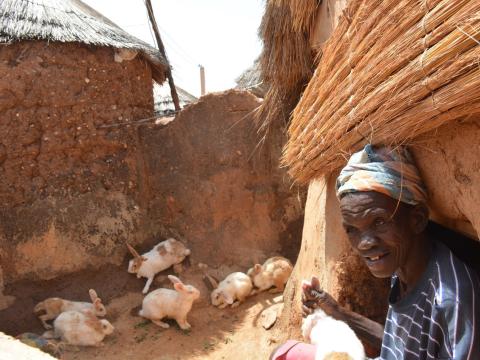Rabbit rearing improves Atiama’s economic and livelihood activities

As climate change continues to influence the decline of northern Ghana’s farmers’ productivity and livelihoods, it is also leaving a legacy of widening poverty. Consequently, adopting livelihood diversification techniques is necessary for farmers’ resilience building. One of the communities witnessing a drastic decline in their livelihood is Wakii, a farming community in the Upper East region of Ghana.
To build their resilience as well as help restore the agility of the environment, World Vision Ghana has introduced rabbit rearing as one of the alternative livelihood and income-generating activities for farmers in Wakii. “I wondered how rabbits rearing could add value to my livelihood if local poultry did little; nevertheless, I decided to give it a try," Atiama, a farmer, said.
Before this intervention, she depended on forest resources such as charcoal production and the sale of firewood. She grew cereal crops too, in addition to keeping a small number of local poultry. In spite of these combined activities, her income and livelihood conditions kept deteriorating.
"Life was difficult. Imagine the shame of being unable to meet your children’s needs. That was the situation I was in then," Atiama said.
Madam Atiama was already looking forward to another opportunity to expand her sources of livelihood and income to enable her to meet her children’s financial, educational, and health needs, as well as household food and nutritional needs.
She learned more about the potential of this intervention to transform livelihood and lives by participating in World Vision's community sensitisation and training programmes. "Who would have believed that rabbit rearing could transform livelihoods and change income levels for a poor farmer like me? she asked.
The Farmer-Managed Natural Regeneration (FMNR) Project, implemented by World Vision, sought to restore degraded landscapes, build farmers’ resilience, and address household food and nutrition security issues in 25 communities in the Upper East region. It introduced farmers to rabbit rearing as an alternative source of livelihood and income.
The project, funded by the Australian Government through the Australian NGO Cooperation Program (ANCP), also addressed youth migration and gender parity issues in the region.
In just a few months, Atiama’s income and livelihood situation began to improve thanks to the frequent multiplication of rabbits and their sale. "I raised one thousand, five hundred and forty-four Ghana cedis (Gh1, 544) equivalent to USD 110.00 from the sale of rabbits within a shorter period of time. This enabled me to join the Savings for Transformation (S4T) group, where I currently save on a weekly basis," she said.
"I saw this as an opportunity to improve my livelihood and income. I no longer cut down trees for commercial charcoal production or firewood," she added.
Atiama was among the first set of lead farmers who adopted the principles and practice of FMNR as well as rabbit keeping, thus contributing significantly to improving environmental agility, soil fertility, increasing agricultural productivity and reducing extreme poverty situation among the beneficiaries of the project.
She is now able to meet her children’s educational, health, and nutritional needs. "I am able to buy my children’s school uniforms, pay school fees, buy books and pens, and renew their health insurance easily. This was difficult before World Vision's intervention," she said.
Over 20,000 farmers, including Atiama, have integrated FMNR principles and practices and diversified their livelihoods. As a result, they are contributing to a reduction in indiscriminate tree felling, commercial charcoal production, and bush burning. This has contributed to the restoration of several hectares of degraded landscapes, improved environmental agility, and soil fertility and gradually reversing desertification while improving livelihoods and building farmers’ resilience.
"I never knew rabbits could change my economic and livelihood condition; now I am a living testimony to the potential of rabbit rearing. I am grateful to World Vision and the Australian Government for the support," Atiama appreciated.